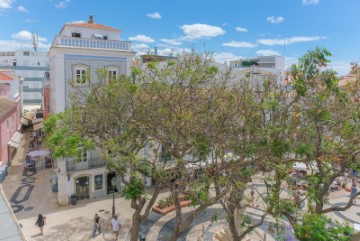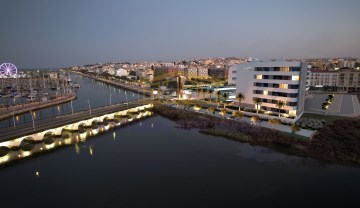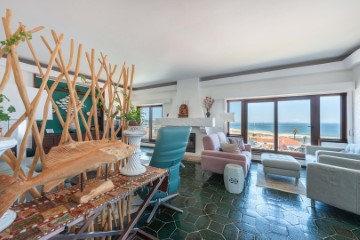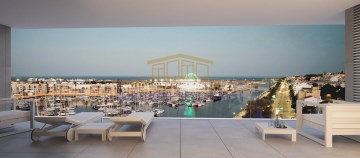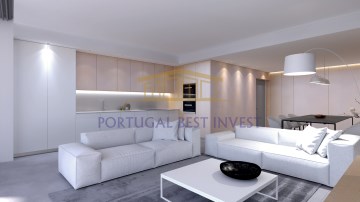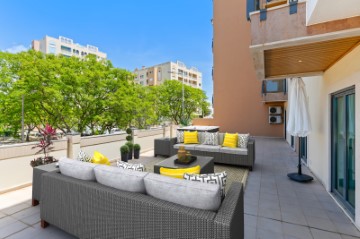Apartment 4 Bedrooms in São Gonçalo de Lagos
São Gonçalo de Lagos, Lagos, Algarve
4 bedrooms
2 bathrooms
197 m²
Apartamento T4 EM CONSTRUÇÃO, em Condomínio de luxo junto á Marina de Lagos.
Vista para a Marina e para o Rio.
Estes apartamentos com acabamentos de Luxo tem as seguintes características:
Sistema de casa inteligente, Certificação Energética A+, chão aquecido, ar condicionado, vidros duplos, aspiração central, estores elétricos em todas as divisões, fibra ótica, janelas do chão ao teto, portas e roupeiros em branco, varandas com gradeamento em vidro.
Cozinha totalmente equipada com eletrodomésticos da Bosch.
Piscina comum para adultos e piscina comum para crianças.
Spa com Ginásio, Jacuzzi, Sauna, Bar/Lounge, Jacuzzi no terraço.
Jardins privados em todo o Condomínio.
CONSTRUÇÃO CONCLUIDA EM JULHO DE 2023.
HISTÓRIA DE LAGOS:
Integrada na pré-história da extremidade sudoeste do Algarve, a área do concelho de Lagos é habitada desde tempos recuados, como o demonstram diversas estações arqueológicas.
O primitivo nome da cidade - Lacohriga - aponta para uma origem celta, cerca de 2.000 anos a. C., sendo, durante um largo período, porto frequentado por fenícios, gregos e cartagineses.
Numerosos vestígios falam do passado de Lagos, mas a época a partir da qual o concelho se torna, em termos históricos, efetivamente conhecido é a partir de 228 a.C., quando se celebrou o tratado entre Cartagineses e Romanos, que fixava o Ebro como fronteira entre eles. Data dessa época o florescimento de Lacóbriga, que se manteve até ao século VII e que foi a antepassada da Lagos atual. A origem de Lacóbriga é bastante desconhecida. Ao que parece, existiam duas, edificadas em locais diferentes. A primitiva povoação teria sido destruída por um terramoto ocorrido no século IV a.C., sem deixar vestígios. A segunda Lacóbriga, cuja fundação se atribui a Bohodes, capitão ou governador cartaginês que fez parte das forças militares de Cartago, que ocuparam o sul da Península Ibérica, no final do século IV a.C.
Lacóbriga virá a ser uma importantíssima cidade na época romana. Num manuscrito do século XVIII, Antiguidades de Lagos e Suas Igrejas diz-se que entre as duas Lacóbrigas existia uma distância de quase meia légua. A partir de 713 quando os árabes são já senhores absolutos da Península, não mais se registam referências a Lacóbriga.
Segundo a história mais recente, Lagos foi conquistada definitivamente aos mouros no ano de 1249 por D. Paio Peres Correia, sendo o ano de 1266 apontado como a data em que Lagos recebeu o primeiro foral, atribuído por D. Afonso III.
No entanto, foi no reinado de Afonso IV que Lagos se afirmou, precisamente com a reconstrução das muralhas da praça e com a vinda para a cidade do governo militar do Algarve.
A 5 de Janeiro de 1361, no reinado de D. Pedro I, Lagos passa a Vila e Concelho com jurisdição própria. Até esta data estava sob o comando do Bispo de Silves que o havia recebido por doação do rei de Castela.
Lagos revela-se com bastante importância, em 1415, no reinado de D. João I, em virtude dos Descobrimentos Portugueses.
O Infante D. Henrique viveu em Lagos, no castelo, depois Palácio dos Governadores, e que também foi destruído pelo terramoto de 1755. Lagos foi, efetivamente, a base das empresas marítimas, o porto de construção e armamento dos navios e o ponto de partida de quase todas as caravelas que partiram para as Descobertas.
#ref:15446286
700.000 €
30+ days ago bpiexpressoimobiliario.pt
View property
